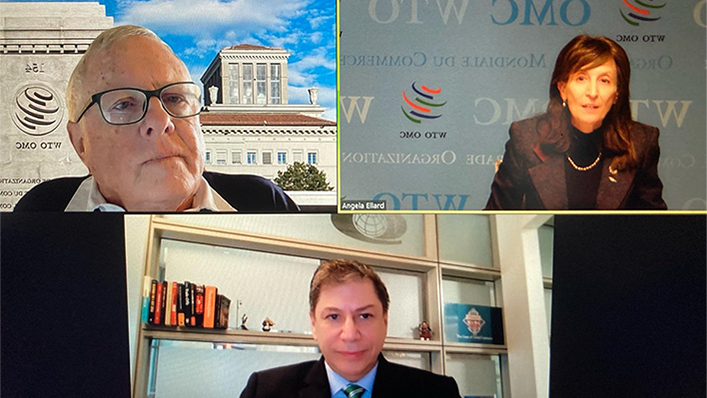
At the outset, DDG Ellard noted that the atmosphere in talks in Geneva has generally been more positive than in the run-up to the previous Ministerial Conference (MC12). However, challenging outstanding issues need to be addressed before ministers head to MC13, which will take place on 26-29 February in Abu Dhabi, United Arab Emirates.
She noted that MC13 priorities include entry into force of the Agreement on Fisheries Subsidies and completing the second wave of negotiations; progress on dispute settlement reform; a decision on the extension of the e-commerce moratorium; agriculture negotiations; development-related issues; and deciding how to integrate outcomes of the joint initiatives into the WTO rulebook. A successful MC13 would achieve outcomes or make substantive progress on as many issues as possible, she added.
DDG Ellard observed that a key priority for MC13 is to build on the achievements of MC12 by concluding the second wave of negotiations on fisheries subsidies that would prohibit subsidies contributing to overcapacity and overfishing. Another priority is to receive additional deposits of instruments from members needed for entry into force of the Agreement on Fisheries Subsidies.
She added that 56 members have already deposited their instruments, which is over half of the required number for entry into force of the Agreement, and that many more are ready or underway. In addition, she underlined the importance of the Fisheries Funding Mechanism to provide the necessary technical assistance to developing and least developed country members that have ratified the Agreement.
DDG Ellard said that reforming the dispute settlement system, together with other vital areas of the WTO, is essential to the future of the organization because it will ensure that WTO rules remain meaningful for the benefit of all members. She said that the ongoing informal technical discussions among members on dispute settlement reform, working towards the goal agreed at MC12 of having a fully and well-functioning dispute settlement system by 2024, have been extremely productive to date, with significant progress made.
At the same time, important outstanding issues, such as the question of second-tier review, are still ongoing. She emphasized, however, that the WTO dispute settlement system has not ground to a halt, with panel review as well as arbitrations and other modalities for resolving disputes being actively used by members.
With respect to WTO reform more broadly, DDG Ellard noted that everyone agrees that the WTO needs reform, but members’ views on what needs to be improved differ. She outlined three broad areas of reform: (i) negotiating new rules and revising the existing rules; (ii) reinvigorating the deliberative function of the organization; and (iii) improving the way the Secretariat assists members.
DDG Ellard said that another negotiating priority is to decide whether to extend the moratorium on the imposition of customs duties on electronic transmissions, which will expire if members do not renew it at MC13. She noted that developed and many developing members support its extension to guarantee stability and predictability for e-commerce trade, and as an important tool for development. By contrast, some developing members question its impact on revenues and on policy space, viewing it as perpetuating the digital divide. DDG Ellard referred to several reports issued by international organizations, including the WTO, and said they could serve as a factual basis for guiding members’ decisions.
Share
Reach us to explore global export and import deals